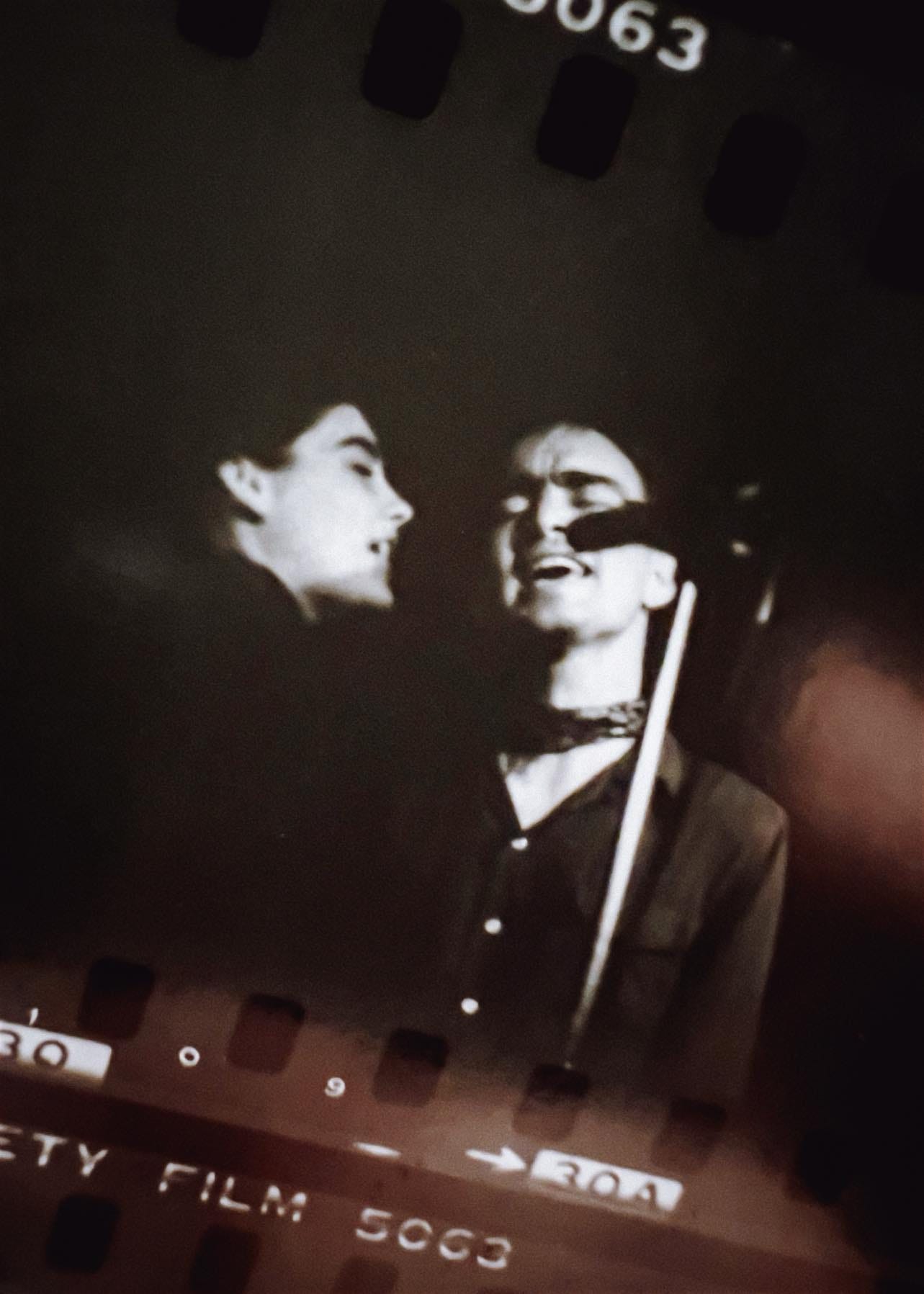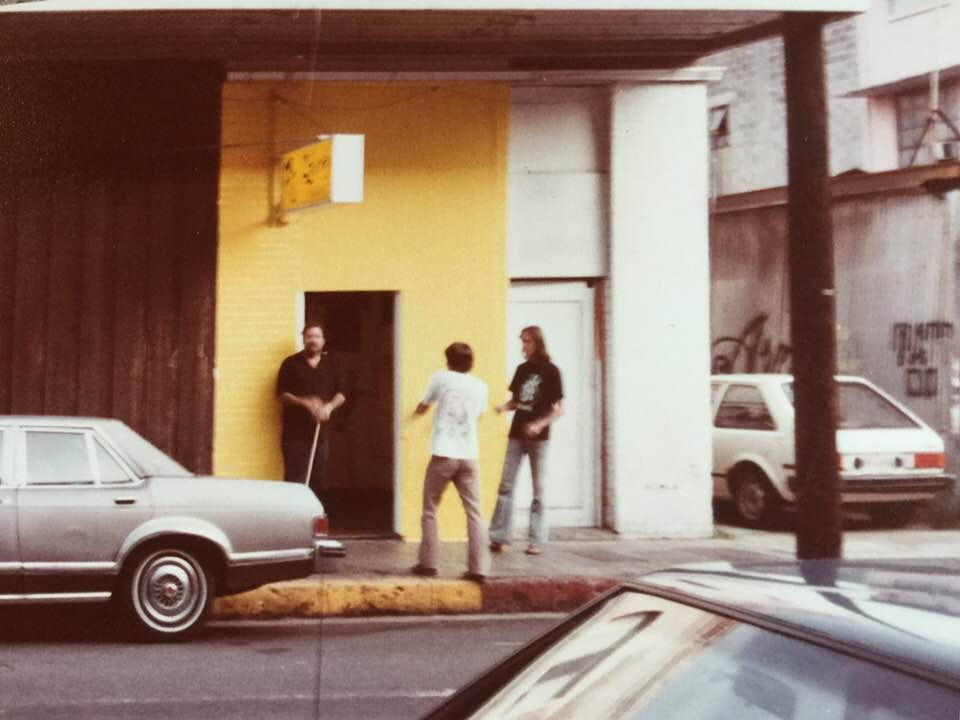Poi Dog in Austin: Frank's Abra Years
Rolling Oahu street band finds a home in Texas, before the beat takes them to Chicago

“Don’t play the beat, be the beat” is the drummer mantra Frank Orrall lived out in the Squids, Hawaii’s first “punk” band, circa 1980. He danced to his own groove sitting down and was unquestionably the star of the group. He’d step to the front mic once a night to sing “Pretty Vacant” and the tourist chicks, the groupies on vacation, would lose themselves.
“I heard Frank used to be chubby,” his girlfriend, years later, told me. That’s how he explained “Porky,” which his old band mates still call him. “Always thin as a rail,” I told her.
The Talking Heads were the first punk band to play Hawaii- at Little Orphan Annie’s on Nimitz Highway in 1979 (right before Fear of Music came out)- and Devo at the University of Hawaii a few weeks later was the next. Those bands were the prime influences on the Squids, whose leader Kit Ebersbach was always thinking of ways to be outrageously mundane. One night when they were playing their residency at the Wave, a gay dance club full of breeders before 1 a.m., Kit gave each member a white t-shirt he had emblazoned with their instrument. His said keyboards, Rudy’s said guitar and so on. That night Frank had a tough time beating away the guys, and then someone told him that “Drummer” was the name of a gay magazine.
Before I settled in Austin in the mid-’80s, I went back and forth between the Mainland and “the Rock” a couple times- 1978 in Los Angeles, 1979-82 in Albany, NY- and whenever I came back, Frank would have a new band. Mumbo Jumbo was ska, Hat Makes the Man was Brit-poppy, Pagan Babies played Afro-pop and reggae at Anna Banana’s. Future Poi pounder John Nelson was a Pagan at one point. Frank was always the drummer.
I moved back in ‘82 to take a job running Michael “Rollo” Malone’s Mr. Lucky T-shirts- an offshoot of China Sea Tattoo. Rollo had moved across Smith Street to a bigger shop so he could tattoo with girlfriend Kandi Everett, but he didn’t want to lose Sailor Jerry’s legendary location so he turned it into a t-shirt shop of his own designs. We were tight with the Squids- Rollo drew their logo and co-wrote first single “Tourist Riot” with guitarist Beano Shots, who was married to my sister Bridget. If they were in Chinatown, they’d stop by and hang out. Frank told me about a couple of sisters who had just moved to the North Shore of Oahu from the Big Island. The youngest one was a badass surfer and her sister, just 16, was a singer-songwriter named Abra Moore I just had to hear.
I met Abra at the entrance of Wave Waikiki nightclub on Kalakaua, and proudly introduced myself as Yikes! Crawford (the notorious fanzine editor), but she just nodded and whisked herself inside.
For years I thought she was stuck up. But when I finally sat down and talked to Abra, in 2002 for an album that never came out, I realized she’s just a uniquely sweet person. What I diagnosed in ‘84 as aloofness was shyness- plus she was underage, trying to slide into the Wave with the band. No time for pleasantries. We talked a lot about Hawaii.
Named after the Julie Harris character from East of Eden, Abra was from Puna, home of the world’s greatest marijuana. Puna Butter made Kona Gold taste like Folger’s, and her father was reportedly in agriculture. There were lotsa hippie kids in Hawaii, but Abra was different. She was her own person in a state where haoles did not benefit from standing out. The titas, usually smacked around at home, bullied it forward, but you learned how to charm and disarm. Or you got your ass kicked.
The son of a noted astronomy professor, who got his PhD from Harvard, and a free-spirited mother who loved folk music, Frank had some science to his soul. He also had some sadness after his mother Betty passed away from cancer in ‘82. Then there was the lawsuit after Hat Makes the Man broke up, when the manager produced two years of dinner, gas and other receipts, plus depreciation on his Mercedes, to claim each member owed him several thousands of dollars.
The ebullient Orrall went inward. He started making cassettes with a four-track in his bedroom, overdubbing drums and other instruments, and selling them as “Poi Dog Pondering” from a box on the sidewalk in front of Woolworth’s. That’s where he and Abra and like-minded musicians would post-up most days, playing their wood guitars and marimbas and bells and whistles. Many of the most-loved Poi Dog songs, including “Living With the Dreaming Body,” “Pulling Touch” and “Everybody’s Trying” were first performed on that Waikiki sidewalk.

Freed from the kit and the kaboodle of band membership, Frank was writing songs at a brisk clip and expanding his consciousness in the metaphysical section of Jelly’s record/book store, where his sister Chris worked. Frank has been nothing if not prolific.
Now he just had to get free from “the world’s most highly-technologized banana republic,” as Bill Mann, a former rock critic for the Toronto Star, wrote in ‘75. Island fever is real, especially if you’re into weird stuff.
Although Poi Dog (Hawaiian slang for a mutt) began as a solo project, Frank envisioned it as a band. He also foresaw a cross-country gypsy roadtrip. He’d climb a tree in his backyard and look out across the Pacific Ocean and see California. They left as five, buying a GMC Suburban in Los Angeles in Jan. 1986 and beginning their journey north to Vancouver and east to New York City.
In late ‘86, Frank and Abra and a couple other haole scruffs made it to Austin. “Our truck was on its last legs, we were completely broke and hadn't eaten in two days," Orrall remembered. When Poi Dog set up next door to the Co-op, they were like no other buskers Austin had ever seen. (This was three years before Twang Twang Shock-a-Boom.) They identified more as beatniks than hippies, but they also had a very melodic sound. People danced. Frank had a strong pop voice, inspired, no doubt, from hearing Hat Makes the Man’s Peter Bond sing the Smiths every night, and his lyrics came right from the heart. But after an hour that first day only one guy had tipped them, tossing a couple bills in the open guitar case. “I went over to get the money, and it was two twenty-dollar bills,” Frank said. “That's when we decided to stay in Austin a little while.”
What kept them here more than three years were the other musicians in town. Suddenly, Frank and Abra were surrounded by major musical talent, and because they had a record deal, with Texas Hotel in California, they could cherry-pick bassist Bruce Hughes, drummer Dick Ross (ex- Joe King Carrasco), violinist Susan Voelz, horn player/accordionist Dave “Max” Crawford and guitarist Adam Sultan. Mike Stewart produced the first record at Arlyn Studios.
“Richly melodic and boundlessly rhythmic, Poi Dog plays happy music in an era when optimism normally spells ignorance," I wrote of them at the time. “Their freshness and vibrancy cut through Austin like a blue stream across a parched countryside.” Rollo called them “professional naives.”
Poi Dog Pondering was the rage of SXSW 1988, the second one, when they levitated the crowd at Club Cairo. But they had a record coming out on Texas Hotel and weren’t thinking past that at the time. Nothing creates a major label feeding frenzy like turning them all down.
But Manhattan was a different story. Texas Hotel sent Poi Dog to NYC to open for labelmates Hetch Hetchy (with Michael Stipe’s sister on vocals) and they stole the show. That’s when things really got crazy with the bidding war.
This was an era when Edie Brickell and New Bohemians, Blind Melon and Blues Traveler were selling big and the neo-hippie movement was hot. Poi Dog didn’t have to pay for dinner once during their week in New York. The band that, just a year earlier had to pool their tip money for a jug of Paul Masson, was getting good at reading the wine list at fine restaurants.
They chose Columbia, signing for a six-figure recording budget, with enough left over for a new van (“Isabella”) and per diem. This time they’d tour the country in style.
“The circus of journalists mostly missed the point, thought we were neo-folk hippies 'cause we could sleep anywhere, had acoustic instruments and dared to be exuberant,” Orrall posted in a remembrance of those early years. “We weren't hippies - we were romantic to the bohemian… - and lusty for life.”
I was guilty of once referring to them as “the Wheatgerm Killers,” which Frank didn’t like at all. They were really more about caffeine, touring with an espresso machine they’d plug into gas station outlets (sending in sweet lost child Abra for permission).
The 1989 self-titled major label debut re-recorded some of the Texas Hotel e.p. and, with Columbia’s support, was a hit on college radio, when that meant something. Some scenesters pissed on these sea urchins as too wide-eyed and innocent, especially when they outdrew everybody but Stevie Ray Vaughan.
In the song "Postcard From a Dream," Frank imagines his muse Abra as a hummingbird lingering over a honeysuckle flower. But the flickering fowl was ready to settle down in Austin, where she started taking guitar lessons from Mitch Watkins (Leonard Cohen, Lyle Lovett), who eventually became her boyfriend. The great jazz guitarist also produced her 1995 debut LP Sing, on the Bohemia Beat label Mark Shumate created to release Jimmy LaFave records.
Shumate licensed Moore’s second album, 1997’s Strangest Places (also produced by Watkins), to the new Arista Austin imprint, which had branched off from Tejano to also sign Robert Earl Keen, Townes Van Zandt, Radney Foster and Sister 7. Abra got a Grammy nomination in ‘98, but was one-and-done with Arista when the Austin office closed in ‘99.
I didn’t ask what happened with Abra and Poi Dog when she dropped out after the first Columbia record. Frank and Abra had come to town as co-lead vocalists, but the first album was all Frank songs, except “Aloha Honolulu” by Bruce Hughes. I figured she wanted to do more of her own songs, so she went solo, but I didn’t know if any acrimony was involved.
The first big Poi Dog show after the second Columbia album Wishing Like the Mountain, Thinking Like the Sea was at Liberty Lunch. If I remember correctly, Abra was in the audience when Frank spotted her and called her to the stage. It sure seemed spontaneous, as the sound man quickly set up a second microphone, but Abra just sang all of “In the Shirt That You Wore” in the same mic as Frank.
“She’s my soul sister,” Frank told me recently. Even as Poi Dog has moved closer to dance music since relocating to Chicago in 1992, Abra has been on the last three PDP albums, and most of the tours this past decade. They continue to have great chemistry, these kids who couldn’t wait to play their new songs for each other.
“We had blood in our hearts that flowed with the road and a desire for adventure,” Frank wrote about the first year of Poi Dog. “When you are following what you love - life comes to you, the world breathes with you.”
Listen to Abra and Frank cover “Fancy” by the Kinks as Mourning Doves.








I still have hand drawn cassette they gave me letting them plug in a tiny amp at All That Jazz (t-shirt shop) Good times.